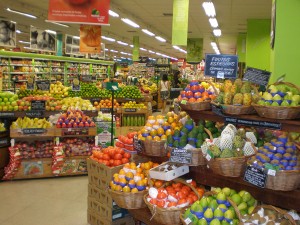Contaminated carts, sweaty eggs, bacterial citrus – these aren’t concerns most shoppers have when blazing down supermarket aisles, eagerly checking items off their lists. But according to food safety certification expert Peter DeLucia (who was recently featured on the Dr. Oz show), we need to be much more proactive when it comes to protecting ourselves from grocery store grime.
To better inform consumers, the New York World created an interactive map of the city, where users can search specific stores in their neighbourhood to check for violations. The results are eye-opening. Torontonians are urged to check their favourite market on DineSafe, a portal that gives inspection reports on cleanliness. But in the meantime, here are a few of DeLucia’s tips for staying ahead of the contamination curve:
Carts and conveyor belts
Wipe them down before you use them. DeLucia suggests we carry antibacterial wipes when we go shopping, and use them to rid the grocery cart of accumulated bacteria. It sounds a bit extreme, but when you consider how many hands have touched the cart – and how it’s usually left outside at the mercy of birds and bad weather – perhaps a few extra moments of work is worth it. Basic food safety training reveals that bacteria can easily transfer from one surface to another, and DeLucia advises to bag everything that touches the cart or conveyor belt. Apparently, these surfaces are dirtier than your average toilet seat.
How the best choose fresh
When it comes to selecting eggs, most of us grab the container on top, open it up, scan for breaks…and that’s about it. However, health experts warn shoppers that they’re missing a crucial component in selecting the best batch – and that’s temperature. Every cool storage unit has a cold line, and eggs stored above that line are probably older, “sweaty” and more likely to spoil. DeLucia advises to shuffle those egg boxes around, and choose one closer to the bottom. It’s unlikely the eggs will be more vulnerable to cracks, and they will most certainly be fresher than their friends at the top.
Scrub your lemons
What do you suppose are the most contaminated items in the grocery store? Meat, poultry, fish? Actually, it’s the citrus fruits. Lemons and limes are amongst the most bacteria-laden items, handled countless times from farm to table. Any good food safety course will tell you to wash your fruits and vegetables, but according to DeLucia citrus need more than just water. He suggests a half-and-half mixture of water and white vinegar – and perhaps an old toothbrush to get into nooks and crannies. Of course, this bath must take place before slicing because bacteria would spread from skin to pulp along the knife.
Would you consider implementing one of these grime-fighting techniques?




